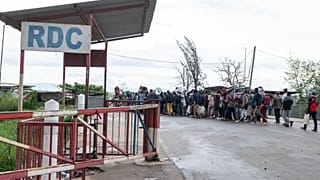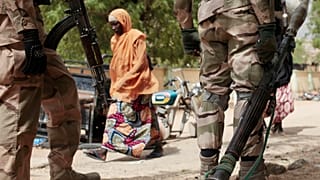Nigeria
Dimly lit and stuffy classrooms stir with life every morning as children file in.
Rays of sunlight stream through wooden windows, the only source of light.
Pupils squint at their books and intermittently the blackboard, as teachers try to hold their attention.
It's a reality for many schoolchildren across Nigeria, where many buildings don't have access to the national electricity grid.
In the Excellent Moral School in Ibadan, school founder Muyideen Raji says it's affecting their learning:
"Education has gone beyond writing and listening to teachers in class alone, so education has gone digital, and there’s no way we can give the students the best of what they need without electricity," he says.
Communities like Excellent Moral School's in Ibadan that have no access to electricity are often surrounded by more fortunate ones that are connected to the grid but experience frequent outages and have to use gasoline and diesel-run private generators.
With long-running petroleum subsidies now removed, many households, schools, hospitals and businesses struggle with the cost of fuel for their backup generators.
The Lorat Nursery and Primary School in Ibadan has stopped using a diesel generator as an alternative due to costs, says headteacher Abdulhakeem Adedoja.
Although the school is in an area that's connected to the grid, they can sometimes go two weeks without power supply.
"We cannot even put our gadgets to use because of there’s no electricity around us,” he says, as computers gather dust in a classroom.
The problem is not just the lack of electricity for computer-aided learning, proper lighting, and fans to make classes less stuffy for pupils and teachers.
It's also that students are unable to complete their school assignments at home.
Adedoja worries the school may have to close, as people are moving away from the area:
"I have some people who have relocated just because they say that there’s no light in this community. So, we are losing pupils in the process," he says.
"Some people have to go with their parent and leave the school.”
With less than 8,000 megawatts of capacity and an average supply of less than 4,000 megawatts — less than half of what Singapore supplies to just 5.6 million people — power outages are an everyday occurrence in Nigeria.
For more energy-hungry small businesses, like restaurants, they either close shop or continue with alternative power generation, incurring high costs in the process.
Ebunola Akinwale, owner of Nature’s Treat Cafe in Ibadan, says she pays 2.5 million Naira (approx. $1,700 USD) monthly to power backup generators in her four branches.
“Some months, it doesn’t feel like I’ve made any profit, it doesn’t feel like that because what should have gone into savings for the business or other things has probably gone into power," she says.
"We forget that it’s not just power that is eating up all the revenue, it’s like a ripple effect, because I also have suppliers that also are having this power issues and meaning their operations have gone up, so cost of some of these raw materials have gone up as well.”
In a country with abundant sunshine, many are looking to solar energy to help fill the gaps, but getting risk-averse investors to finance major solar projects that would give Nigeria enough reliable energy is an uphill struggle.
That means millions in the country are finding ways to adapt to life with little to no electricity.
“If nothing changes, and it’s still what it is now or it gets worse, I probably will change the model of the business, I probably will focus more online, probably maybe, might close one or two branches and maybe buy bikes instead and do more deliveries," says Akinwale.
"I might just look at the model of the business so that I have less business costs. I probably won’t close my business because am very passionate about what I do, but I probably will think of ways where am less reliant on maybe power.”











02:06
ECOWAS rejects Guinea-Bissau transition, warns of sanctions
01:00
Pix of the Day December 12, 2025
01:48
Safe but scarred: Papiri schoolchildren return home as others remain captive
01:00
Videos. Pix of the Day: December 10, 2025
01:24
Benin government says short-lived coup left casualties on both sides
Go to video
Sahel alliance warns Nigeria it will 'neutralise' any unauthorised aircraft in its airspace